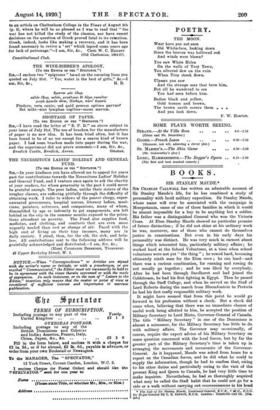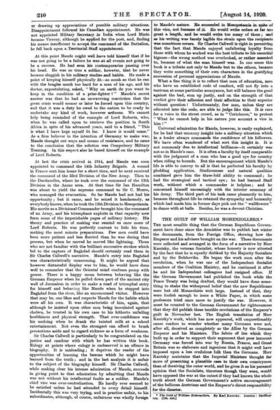BOOKS.
SIR STANLEY MAITDE.*
Sin Cinemas CaLLWELL has written an admirable account of Sir Stanley Maude's life, for he has combined a study of personality with lucid military exposition. Sir Stanley Maude, whose name will ever be associated with the campaign in Mesopotamia, came of one of those families in which it would be almost impossible for a boy to be anything but a soldier. His father was a distinguished General who won the Victoria Cross. At Eton Stanley Maude showed no particular promise of future distinction ; if he did not shine at his ordinary work he was, moreover, one of those who cannot do themselves justice in examinations. But even in his early days his personality was distinct. He was very much in earnest about things which interested him, particularly military affairs ; ho worked hard at the School Volunteers, at a time when school volunteers were not yet " the thing " ; he rowed hard, becoming ultimately ninth man for the Eton crew ; he ran hard—and there was a curious combination, for running and rowing do not usually go together ; and he was liked by everybody. After he had been through Sandhurst and had joined the Coldstream, he had his first fighting in Egypt. Then he passed through the Staff College, and when he served on the Staff of Lord Roberts during the march from Bloemfontein to Pretoria he had his first really responsible military work.
It might have seemed that from this point he would go forward in his profession without a check. But a check did come when, believing that there was no immediate chance of useful work being allotted to him, he accepted the position of Military Secretary to Lord Minto, Governor-General of Canada. The title " Military Secretary " in one of the Dominions is almost a misnomer, for the Military Secretary has little to do with military affairs. The Governor may occasionally, of course, require the expert advice of his Military Secretary on some question concerned with the local forces, but by far the greater part of the Military Secretary's time is taken up in arranging the movements and ceremonies of the Governor- General. As it happened, Maude was asked from home for a report on the Canadian forces, and he did what he could to supply the information, though he had to confess that, owing to his other duties and particularly owing to the visit of the present King and Queen to Canada, he had very little time to make inquiries. Nevertheless, he had so thoroughly aoquired what may be called the Staff habit that he could not go for a ride or a walk without carrying out reconnaissances in his head
• The Life of Sir Stanley Maude. Lieutenant-General.
By hiajor,General Sir C. Ts. Callwell, K.C.B. London : Constable and Co. [21s. net.)
or drawing up appreciations of possible military situations. Disappointment followed his Canadian appointment. He was not appointed Military Secretary In India when Lord Minto became Viceroy, although he applied for the post, and, finding his means insufficient to accept the command of the Battalion, he fell back upon a. Territorial Staff appointment.
At this point Maude might well have told himself that if he was not going to be a failure he was at all events not going to be a success. He had seen his contemporaries passing over his head. He was so true a soldier, however, that he never became sluggish in his military studies and habits. He made a point of keeping himself physically „fit—so much so that he ran with the beagles much too hard for a man of his age, and his doctor, expostulating, asked, " Why on earth do you want to keep in the condition of a prize-fighter ? " Maude's secret answer was that he had an unwavering conviction that the great crisis would sooner or later be forced upon this country, and that it was a duty he owed to the nation to be ready to undertake any kind of work, however arduous. We cannot help being reminded of the example of Lord Roberts, who, when he was called upon to retrieve the position in South Africa in spits of his advanced years, said to a friend, " This is what I have kept myself fit for. I knew it would come." As a firm believer in the intention of Germany to make war, Maude thought out ways and means of resistance, and he came to the conclusion that the solution was Compulsory -Military Training. In this respect also he based himself on the example of Lord Roberts.
At last the crisis arrived in 1914, and Maude was soon appointed to command the 14th Infantry Brigade. A wound in France sent him home for a short time, and he next received the command of the 33rd Division of the New Army. Then to the Dardanelles, where he took over the command of the 13th Division in the Anzac area. At that time Sir Ian Hamilton -was about to yield the supreme command to Sir C. Monro, who managed the evacuation. So far Maude had not had his opportunity ; but it came, and he seized it handsomely, as everybody knows, when he took the 13th Division to Mesopotamia. His merits as a Divisional Commander brought him the command -of an Army, and his triumphant exploits in that capacity now form some of the imperishable pages of military history. His theory and practice of making war remind us once more of Lord Roberts. He was perfectly content to bide his time, making the most minute preparations. Few men could have been more patient and less flurried than he was during that process, but when he moved he moved like lightning. Those who are not familiar with the brilliant successive strokes which led to the capture of Baghdad should certainly read them in Sir Charles Callwell's narrative. Maude's entry into Baghdad was characteristically unassuming. It might be argued that 'however distasteful display was to him, he would have done well to remember that the Oriental mind confuses -pomp with power. There is a happy mean between behaving like the German Emperor when he pulled down part of the ancient city wall of Jerusalem in order to make a road of triumphal entry for himself and behaving like Maude when he stepped into Baghdad from the river, like an unconcerned visitor. However that may be, one likes and respects Maude for the habits which were all his own. It was characteristic of him, again, that Although he insisted upon other men being inoculated against cholera, he trusted in his own case to his hitherto unfailing healthiness and physical strength. 'That over-confidence was his undoing when he drank the tainted milk at a school entertainment. Not even the strongest can afford to brush precautions aside and to regard sickness as a form of weakness.
Sir Charles Callwell is particularly to be congratulated on the justice and candour with which he has written this book. Eulogy at points where eulogy is undeserved is an offence in biography. It is misleading ; it deprives the reader of the opportunities of learning the lessons which he might have learned from the truth ; and in the last analysis it is unfair to the subject of the biography himself. Sir Charles Callwell, while making clear his intense admiration of Maude, succeeds in giving point to that admiration by admitting that Maude was not without his intellectual faults as a soldier. Maude's chief vice was over-centralization. He hardly ever seemed to be satisfied unless he had attended to every detail himself. Incidentally this was very trying, and in practice unfair, to his subordinates, although, of course, unfairness was wholly foreign to Maude's nature. He -succeeded in Mesopotamia in spite -of this vice, not because of it. He would write orders at far .too great a length, and he would write too many of them ; and as his -writing was barely legible the strain upon the recipients was sometimes severe. Sir Charles Callwell is right in perceiving that the fact that Mande enjoyed unfaltering loyalty from those with whom he worked was the best tribute to his essential bigness—the wrong method was overlooked, or rather assented to, because of what the man himself was. In one sense this book is a tribute not only to Maude but to the others, because they write something of their own characters in the gratifying succession of personal appreciations of Maude.
What a fine thing it is to reflect that men of education, men who have an established code of conduct, will not fly into a tantrum at some particular annoyance, but will balance the good against the bad, sum up justly, and on the strength of that verdict give their adhesion and their, affection to their superior without question ! Unfortunately, few men, unless they are educated into the code, are able to judge like this. It is rare for a voice in the street crowd, as in " Coriolanus," to protest " What he cannot help in his nature you account a vice in him ! "
Universal admiration for Maude, however, is easily explained, for he had that uncanny inei .14 into a military situation which in a leader always commands the confidence of his followers. We have often wondered of what sort this insight is. It is not commonly due to intellectual brilliance—it certainly was not so in Maude's case. It is often a faculty by itself comparable with the judgment of a man who has a good eye for country when riding to hounds. But the encouragement which Maude's life is able to convey to all is that he perfected his faculty by plodding application. Studiousness and natural qualities combined gave him the three-fold ability to command ; he had the strategical and tactical eye ; he had learned Staff work, without which a commander is helpless ; and he concerned himself unceasingly with the interior economy of his Army. The third part of his task came pleasantly to him, because throughout life he retained the sympathy and humanity which had made him in former days pick out the " wallflowers " to dance with at balls. Besides, he was a devout Christian.



































 Previous page
Previous page